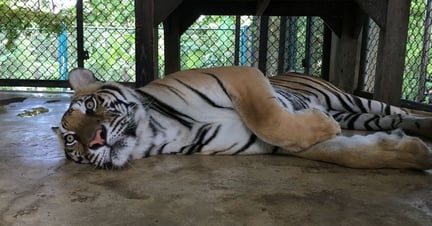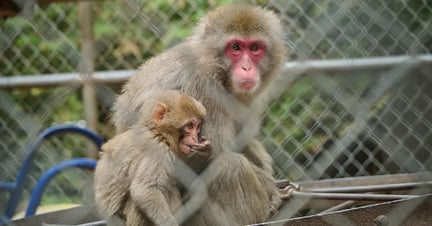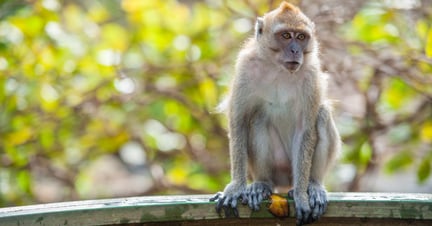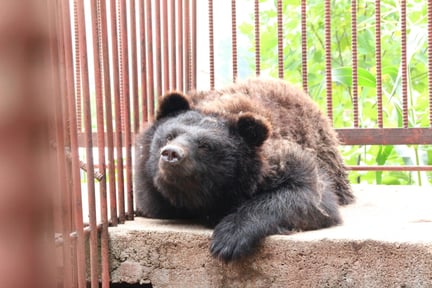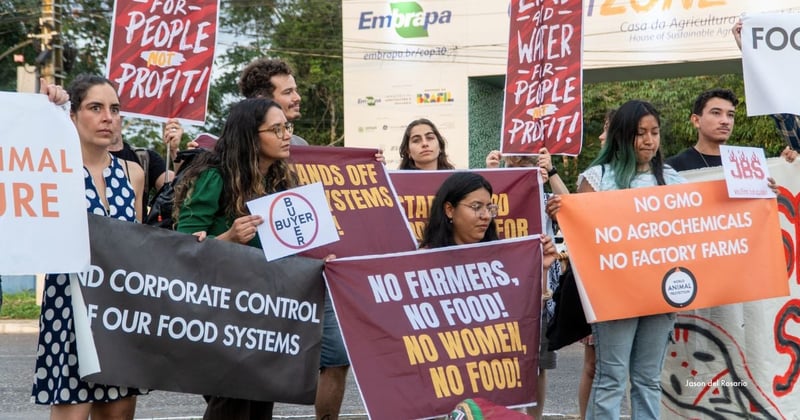
Climate activists at COP30 confront industry lobbyists at AgriZone
Press release
Climate activists at COP30 confront industry lobbyists at AgriZone as week one begins, pushing for urgent climate action and a just food system transition.
Belém, Brazil - Today, climate campaigners at COP30 confronted Big Agriculture lobbyists in a protest at the 'AgriZone', a new zone near the COP venue dedicated to agribusiness interests and sponsored by corporate giants Nestlé and Bayer.
The AgriZone is the latest development in the growing trend of COP - the world's only multilateral decision-making forum on climate change - being co-opted by big polluters and business interests. In recent years, the influence of industry lobbyists over the climate convention has grown, with more than 5,000 fossil fuel lobbyists given access since COP26.
Despite the COP Presidency including land restoration and sustainable agriculture in its Action Agenda, the Brazilian government made the unprecedented move to capitulate to industrial agriculture, which is a main driver of deforestation in the Amazon and produces a third of global greenhouse gas emissions. The campaigners, as part of the Global Campaign to Demand Climate Justice, condemned the move, emphasizing the danger of allowing Big Agriculture to influence world leaders and climate negotiators.
It is deeply concerning to see a third zone popping up at COP30 dedicated entirely to agribusiness interests. Industrial animal agriculture is not only a leading cause of emissions, but a major driver of deforestation and farmed and wild animal suffering.
Giving agribusiness a major seat at the table at this COP will drown out the voices most affected by climate change. 'Big ag' are not climate champions, they are fuelled by greed as they harm animals, people and the planet.
Asian movements are here to fight back against the co-optation of COP and other multilateral processes. Asia is the biggest hunger hotspot in the world, representing 55% of the world's hungry, and incurring trillions of dollars in climate-related losses per year. Asian peasants, fishers, and women are forced to feed the world, while they are left starving. That is why we cannot let this greenwashing from Bayer, Nestlé, JBS, and their allies in government go unchallenged.
We know industrial agriculture has contributed greatly to the food and climate crises, and we cannot let Big Ag get away with it. Food, land, and water are for people, not profit! Food is a right, not mere commodities for Big Ag's profits.
The AgriZone is nothing more than a huge greenwashing space. While social organizations and other mortals usually compete to be heard in spaces in the Blue Zone and the Green Zone, agribusinesses have a huge space dedicated to dazzling negotiators and convincing them that they are not major polluters but rather the saviours of the planet.
The globalized agri-food system focused on livestock does not fulfil its purpose of feeding the world because it is designed to produce money, not food.
Inside the AgriZone, large companies, think tanks, and supposedly independent research centers are disguising their model with their 'climate-smart' models, their smart seeds, their digitization, and their metrics, while they are producing a food and agricultural crisis and a countryside without peasants, and without memory and diversity.
Industrial agriculture is fuelling both the climate and food crises, yet its biggest players are being given a stage at COP30 to greenwash their destruction. We're here to say: food is not a commodity, it's a right - and real climate action means taking power away from polluters and putting it in the hands of the people who feed the world.
Our land doesn't need promises of market, it needs respect. Our food comes from the live forest, not from fabrics that kill the People's rivers and souls.
Climate spaces must stop being complicit with all forms of extractivism creating the crisis. The agribusiness has been responsible for the water crisis in the Ngiwa Valley of Tehuacan region in Mexico, and they must stop greenwashing their image at COP30.
An intersectional lens in strategies to combat Climate Change is not optional but critical for effective resilience of marginalized women. The realities of nomadic women, widows, and women with disabilities cannot be addressed through one-size-fits-all responses. Intersectional data collection and participatory methodologies that center marginalized voices are key to ensuring no one is left behind!
Latest news
-
Seventy two tigers die in Thailand as virus exposes...
News
Seventy two tiger deaths in Chiang Mai show how captive conditions heighten disease risk and reinforce the urgent...
-
Viral baby macaque draws attention to captive primate welfare
News
A viral baby macaque named Punch in Japan draws attention to the emotional needs of captive primates and...
-
Wildlife tourism risks highlighted after Thailand monkey attack
News
A recent monkey attack in Thailand sparks renewed warnings about the dangers of wildlife encounters and calls for...
-
Historic bear bile farming ban brings hope for bears...
News
The Republic of Korea has banned bear bile extraction from 2026. Further action is now needed to protect...
